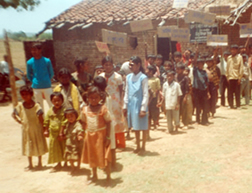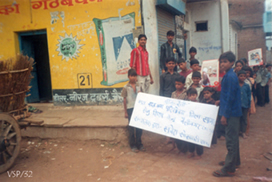Madhya Pradesh is located
in the geographical heart of India. The state straddles
the Narmada River, which along with the Vindhya and Satpura mountain
ranges, constitute the boundary between the north and south of India. Sagar is an agricultural village, typical of the innumerable Indian villages where more than seventy percent of the population lives. 
Since its foundation
in 1995, our NGO partner has been dedicated to alleviate what they perceive
as unconscionable poverty, an excessive mortality rate, the exploitation
of women, the degradation of the environment, and other urgent issues
of village life. They have helped communities by establishing food programs,
spearheading sustainable agricultural development, encouraging natural health care, supporting schools,
and several other initiatives. The children at the Sagar School
are now enjoying proper nutrition,
thanks to the support of many generous donors from within India and abroad. The children now have the chance to break the cycle of illiteracy and poverty.
Traditionally, many agricultural families keep their children at home occupied in farm chores, and the children grow up without the chance to receive an education. In Sagar village, schoolteachers and other volunteers
went door-to-door convincing parents to let their children attend school. Eventually many parents
realized the importance of education and allowed their children to attend classes.
The children still help with the farm and continue to learn the craft,
but now they have more skills and the possibility of a brighter future.
And for both parents and children, the free meals prepared at the school
provide substantial relief. to let their children attend school. Eventually many parents
realized the importance of education and allowed their children to attend classes.
The children still help with the farm and continue to learn the craft,
but now they have more skills and the possibility of a brighter future.
And for both parents and children, the free meals prepared at the school
provide substantial relief.
For the volunteers and staff at Feed A Village, it is a privilege
to assist in the development of these programs. We have a strong commitment to make
the school ever more ideal, and plan to participate in future projects that include the physical expansion of the school, the development of an
organic farm to provide fresh produce for the school kitchen and to
train the children in sustainable farming techniques, and the addition
of vocational education to the school curriculum, targeted to help young
girls develop skills in traditional handicrafts and household management.
|
